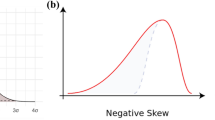Abstract
In statistics, and in everyday life as well, the arithmetic mean is a frequently used average. The present study reports data from interviews in which students attempted to solve problems involving the appropriate weighting and combining of means into an overall mean. While mathematically unsophisticated college students can easily compute the mean of a group of numbers, our results indicate that a surprisingly large proportion of them do not understand the concept of the weighted mean. When asked to calculate the overall mean, most subjects answered with the simple, or unweighted, mean of the two means given in the problem, even though these two means were from different-sized groups of scores. For many subjects, computing the simple mean was not merely the easiest or most obvious way to initially attack the problem; it was the only method they had available. Most did not seem to consider why the simple mean might or might not be the correct response, nor did they have any feeling for what their results represented. For many students, dealing with the mean is a computational rather than a conceptual act. Knowledge of the mean seems to begin and end with an impoverished computational formula. The pedagogical message is clear: Learning a computational formula is a poor substitute for gaining an understanding of the basic underlying concept.
Similar content being viewed by others
References
KaputJ. and ClementJ., ‘The roots of a common reversal error’, Journal of Mathematical Behavior 2 (1979), 208.
KrutetskiiV. A., The Psychology of Mathematical Abilities in School Children, University of Chicago Press, Chicago, 1976.
Rosnick, P., ‘Learning without understanding: The effect of tutoring strategies on algebra misconceptions’, Journal of Mathematical Behavior (in press).
SkempR. R., 1979, Intelligence, Learning and Action, Wiley, Chichester.
TverskyA. and KahnemanD., 1974, ‘Judgment under uncertainty: Heuristics and biases’, Science 185, 1124–1131.
Author information
Authors and Affiliations
Additional information
Research support: Research reported in this paper was supported by NSF research award No. SED78-22043 in the Joint National Institute of Education-National Science Foundation Program of Research on Cognitive Processes and the Structure of Knowledge in Science and Mathematics.
Rights and permissions
About this article
Cite this article
Pollatsek, A., Lima, S. & Well, A.D. Concept or computation: Students' understanding of the mean. Educ Stud Math 12, 191–204 (1981). https://doi.org/10.1007/BF00305621
Issue Date:
DOI: https://doi.org/10.1007/BF00305621




